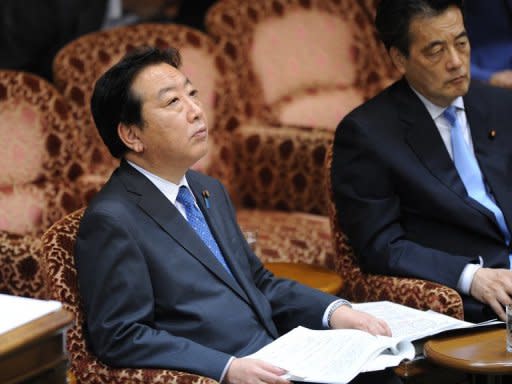Japan lawmakers vote to double sales tax
A bill to double Japan's sales tax and partially plug its gaping debt hole cleared the final parliamentary hurdle Friday in a triumph for the prime minister that could also cost him his job. The legislation, which at the same time makes provision to revamp the country's precarious social security system, has been the main focus of Yoshihiko Noda's 11-month premiership. The bill is a rare tangible achievement in the revolving door world of Japanese leaders that has seen six new men step into the role in as many years. The House of Councillors on Friday approved the government bill by a majority of 188 to 49 with the support of major opposition parties after weeks of horse-trading. Although his party enjoys a handsome majority in the lower, more powerful, house, Noda is without the numbers in the upper chamber and had to offer opponents the carrot of a general election in return for the bill's passage. Observers say Noda's riven Democratic Party of Japan (DPJ) is likely to suffer at the hands of voters disappointed by their lacklustre three years in office and may punish him in September's party leadership election. Quibbling former party members have complained that the DPJ came to power in 2009 without reference to any tax rise. At a news conference following the vote, Noda apologised for the absence of any sales tax legislation in the party's manifesto, but defended his move. "We have been mired in a position that means we need to ensure stable financial sources for social security," he told reporters. "We should not exploit our future (through borrowing). It is not feasible to have a system where benefits mainly go to the older generation while burdens go mainly to the working generation." Ahead of the vote, Noda's Finance Minister Jun Azumi hailed the bill. "It is an historic achievement," he told reporters, according to the website of the Nikkei. "Fiscal reconstruction is particularly necessary for Japan," said Azumi, a reference to its debt level, which stands at an industrial-world high of around twice its GDP. "At a time when the global economy is unstable, Japan's firm handling of fiscal reconstruction will get rid of one risk and lead to stability globally." International bodies, Japanese newspapers and the bulk of domestic commentators agree that raising consumption tax in stages to 10 percent is a good idea. But less than half of the electorate approves of the plan, polls show, with populist politicians capitalising on the unwillingness of people to pay more tax in an economy that has been treading water for years. Noda on Thursday rode out a bid by a collection of minor parties -- including former rebels from the DPJ -- to pass a motion of no-confidence in him after the Liberal Democratic Party (LDP) agreed not to support the move. But the vague pledge he would hold elections "in the near future" has irked his own lawmakers, many of whom are likely to lose their seats the next time the electorate is asked for an opinion. Despite their co-operation on the tax rise, the LDP is seen likely to seize any opportunity it has to be rid of Noda and has refused to rule out its own no-confidence motion against him. "A movement to oust Noda from the premier's post may begin and his re-election in the party presidential vote in September is now doubtful," said Tetsuro Kato, professor of politics at Hitotsubashi University. "Sure, the tax hike is an important issue in the context of the global environment where Europe is suffering from a sovereign debt crisis, and so Noda would earn his name in history. "But with a political crisis just postponed after the agreement with the opposition, Noda's government is destined to be as short-lived as his predecessors' were," Kato said.




